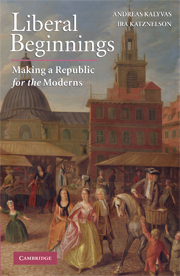Book contents
- Frontmatter
- Contents
- Acknowledgments
- 1 Beginnings
- 2 The Rhetoric of the Market: Adam Smith on Recognition, Speech, and Exchange
- 3 Agonistic Liberalism: Adam Ferguson on Modern Commercial Society and the Limits of Classical Republicanism
- 4 After the King: Thomas Paine's and James Madison's Institutional Liberalism
- 5 Embracing Liberalism: Germaine de Staël's Farewell to Republicanism
- 6 On the Liberty of the Moderns: Benjamin Constant and the Discovery of an Immanent Liberalism
- 7 After Republicanism: A Coda
- Index
- References
6 - On the Liberty of the Moderns: Benjamin Constant and the Discovery of an Immanent Liberalism
Published online by Cambridge University Press: 05 September 2012
- Frontmatter
- Contents
- Acknowledgments
- 1 Beginnings
- 2 The Rhetoric of the Market: Adam Smith on Recognition, Speech, and Exchange
- 3 Agonistic Liberalism: Adam Ferguson on Modern Commercial Society and the Limits of Classical Republicanism
- 4 After the King: Thomas Paine's and James Madison's Institutional Liberalism
- 5 Embracing Liberalism: Germaine de Staël's Farewell to Republicanism
- 6 On the Liberty of the Moderns: Benjamin Constant and the Discovery of an Immanent Liberalism
- 7 After Republicanism: A Coda
- Index
- References
Summary
Reading Benjamin Constant provides a privileged access to the unfolding and gradual crystallization of modern continental liberal constitutionalism within and against a republican background. His experience parallels Germaine de Staël's, but because Constant was a more explicitly reflective and systematic political thinker, we can see this process develop in a more lucid manner. With Constant as our guide, we trace another political pathway for the emergence of postrevolutionary French liberalism. As we have seen, with the king deposed, monarchy's main doctrinal antagonist, republicanism, failed to fill the vacuum of authority and neutrality at the center of the state. This incapacity impelled a young generation of republicans, notably including Staël and Constant, to question their initial commitments and search for more effective political solutions. Encountering theories of rights, they produced a body of thought that gradually broke, though not completely, with its republican past, to become an independent and distinctive political doctrine.
Their liberalism faced two strong adversaries, each also competing to replace the deposed king. The political spectrum polarized between counterrevolutionaries and radical republicans. Satisfied with neither position, the generation of new liberals understood that substitution for the monarch demanded new instruments that could wear a magisterial mantle of neutrality. To this end, they designed a strategy of transcendence to supersede the radical and conservative extremes. They did so by raising the level of abstraction to constitute an impartial and objective point of view from which neutrality, detached from the person of the king, could reappear in the formal and procedural activities of the state's institutional ensemble.
- Type
- Chapter
- Information
- Liberal BeginningsMaking a Republic for the Moderns, pp. 146 - 175Publisher: Cambridge University PressPrint publication year: 2008
References
- 1
- Cited by



